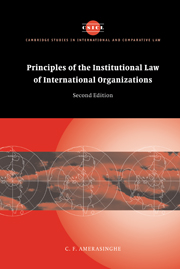Book contents
- Frontmatter
- Contents
- Preface
- List of abbreviations
- Table of cases
- 1 Introduction
- 2 Interpretation of texts
- 3 Legal personality
- 4 Membership and representation
- 5 Non-Judicial organs of organizations
- 6 Acts of non-judicial organs: their legal effect
- 7 Acts of non-judicial organs: the doctrine of ultra vires
- 8 Judicial organs
- 9 The internal law: employment relations
- 10 Privileges and immunities
- 11 Financing
- 12 Responsibility to and of international organizations
- 13 The liability of member states vis-à-vis third parties
- 14 Amendment of constitutions
- 15 Dissolution and succession
- 16 The settlement of disputes
- Index
- Cambridge Studies in International and Comparative Law
8 - Judicial organs
Published online by Cambridge University Press: 10 December 2009
- Frontmatter
- Contents
- Preface
- List of abbreviations
- Table of cases
- 1 Introduction
- 2 Interpretation of texts
- 3 Legal personality
- 4 Membership and representation
- 5 Non-Judicial organs of organizations
- 6 Acts of non-judicial organs: their legal effect
- 7 Acts of non-judicial organs: the doctrine of ultra vires
- 8 Judicial organs
- 9 The internal law: employment relations
- 10 Privileges and immunities
- 11 Financing
- 12 Responsibility to and of international organizations
- 13 The liability of member states vis-à-vis third parties
- 14 Amendment of constitutions
- 15 Dissolution and succession
- 16 The settlement of disputes
- Index
- Cambridge Studies in International and Comparative Law
Summary
This chapter deals briefly with judicial institutions (organs or bodies) of the international legal system which are not national judicial bodies, concentrating on some of them, as described below. Only some of the more important aspects of relevant institutions will be discussed. This is not meant to be an exhaustive consideration of such institutions. It must be remembered that, in respect of organs, the concern in this treatise, because of its subject matter, is with organs of international organizations, even though much, at least, of what is said may be true of all international judicial bodies and even national judicial bodies.
Forms of organs
Two forms of such judicial institutions of a strictly and essentially judicial character have evolved: (i) those which by and large have an entirely separate status, whether created by the constitution of an international organization or otherwise; and (ii) those which, though in principle independent, are created as organs proper of international organizations by the constitution of an international organization or by other organs of international organizations.
The first category includes:
(a) judicial institutions such as the PCIJ, created by a separate statute;
(b) judicial institutions such as the ECtHR and the IACtHR, created by human rights conventions but connected to, while not being described in such conventions as, organs of the relevant organizations, namely the Council of Europe and the OAS, respectively;
(c) the International Tribunal for the Law of the Sea (ITLOS), created by the UN Law of the Sea Convention (UNCLOS) of 1982, and international arbitral tribunals, such as the Iran–US Claims Tribunal, established under an individual international agreement.
All these are not organs proper of international organizations, though they are in fact judicial institutions as such. They are also not described as organs of international organizations.
- Type
- Chapter
- Information
- Publisher: Cambridge University PressPrint publication year: 2005



